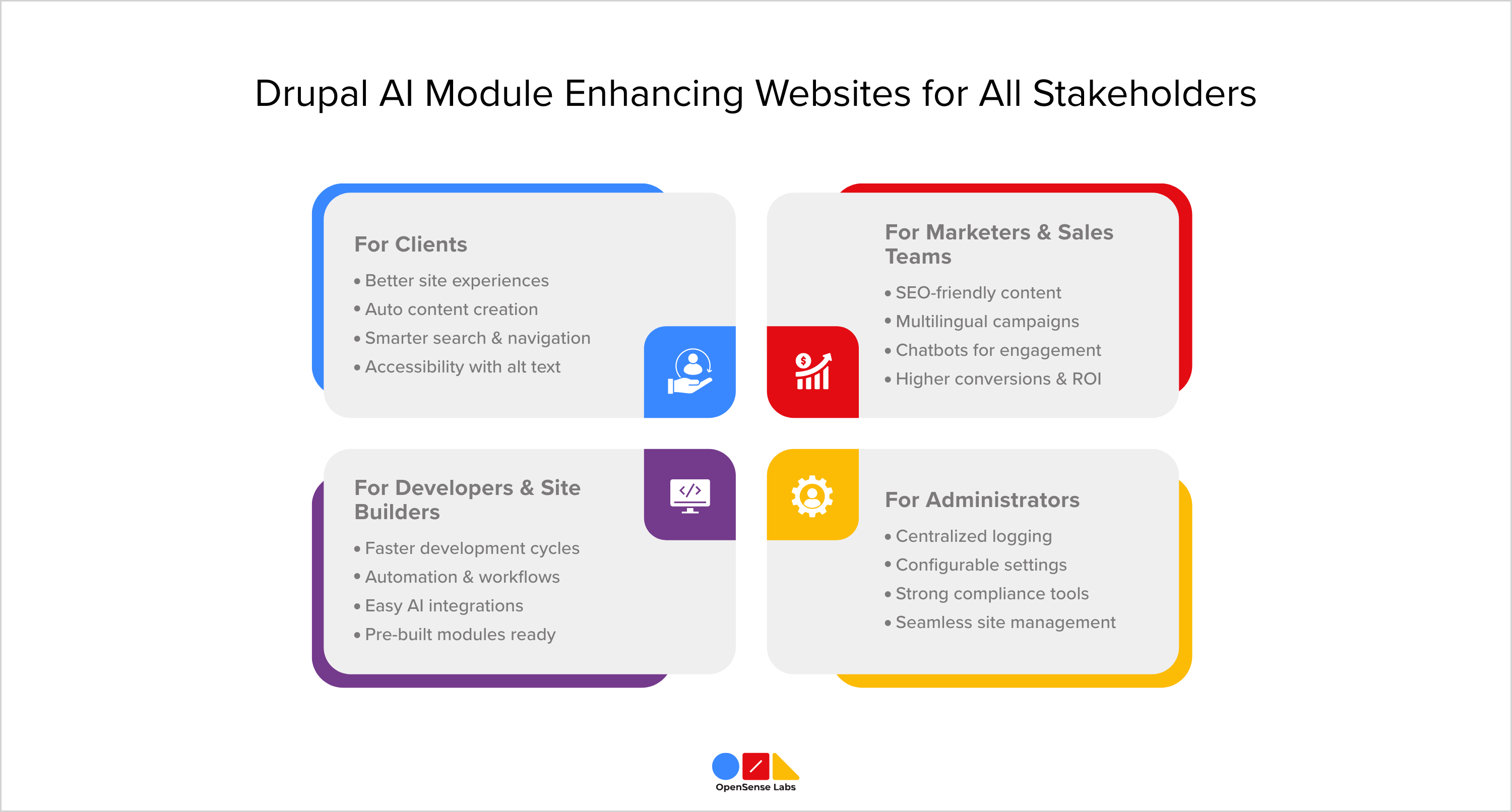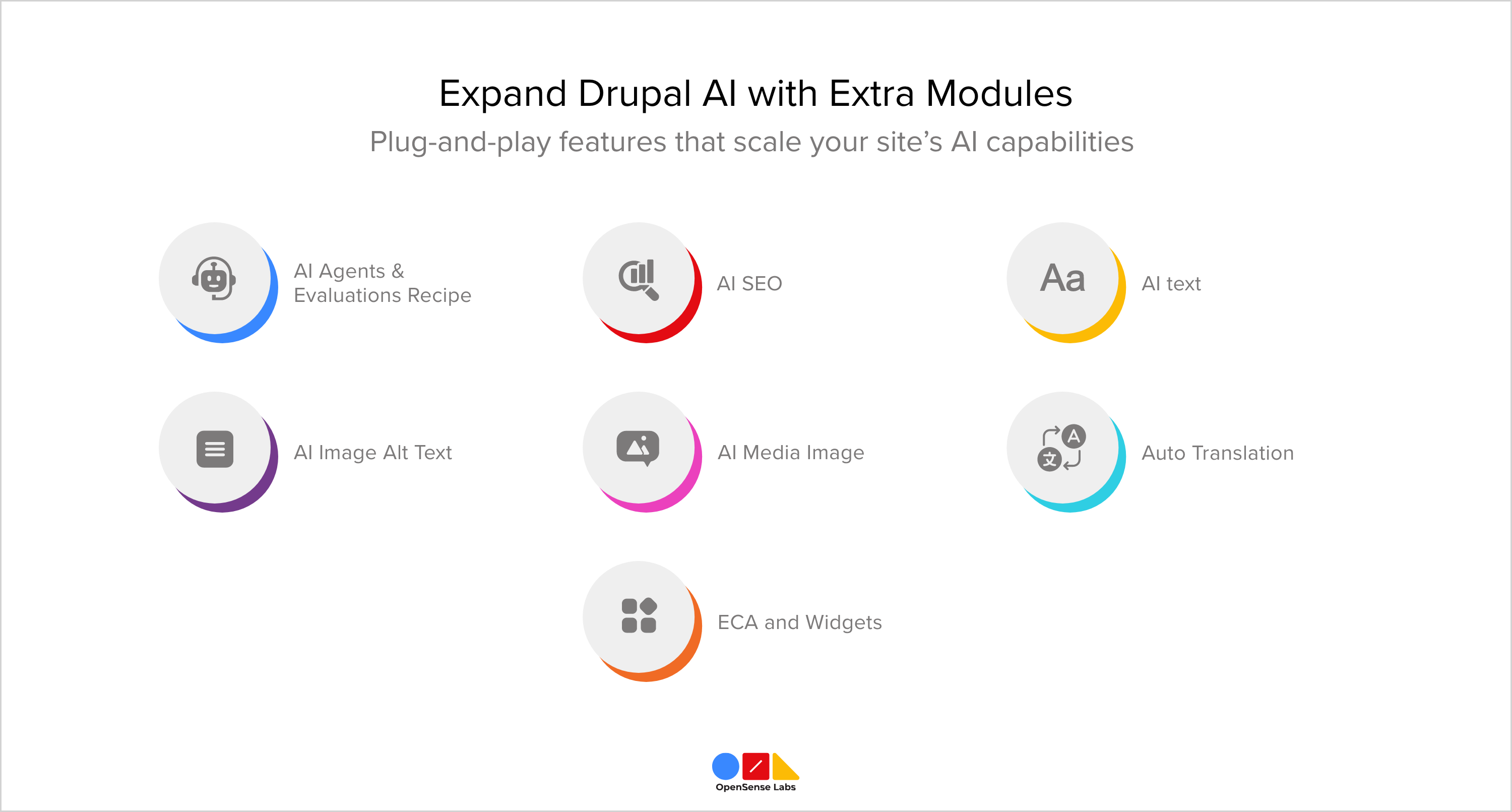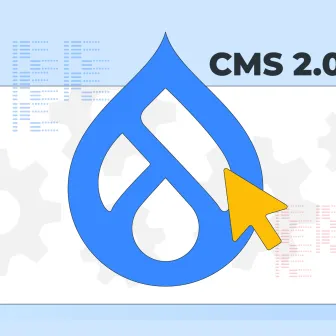Transform Your Website with Drupal AI Module in 2025
Drupal is quickly progressing in Artificial Intelligence with the creation of the Drupal AI Module and the upcoming Drupal AI Initiative.
Imagine a content editor who is feeling swamped as they work to distill a complex, technical white paper for the homepage.
At the same time, a developer finds themselves caught in a loop, redoing the same form validation code, while the marketing lead anxiously awaits campaign images that the already burdened design team has yet to provide.
These delays are common, but what if your Drupal site could take on some of that workload?
This is where the Drupal AI Module comes into play. Designed as a subtle yet powerful framework, it integrates AI directly into your site to help it run more efficiently and intelligently. By doing so, it allows teams to focus on high-value work without added complexity.
With the Drupal AI Module, you can generate content, refine or rewrite long passages, create images, and connect with the AI tools you already rely on, whether that’s OpenAI, Anthropic, Google Gemini, or even your own self-hosted models.
In this blog, we will explore how the Drupal AI Module improves websites with features such as content automation, semantic search, chatbots, translation, and compliance checks. You will also discover how it helps stakeholders, along with important updates from the latest Drupal AI releases that make building sites smarter and ready for the future.
Before we continue in this blog and explore Drupal's AI features, don't just stop here; check out how our AI services can assist you in utilizing these tools to create genuine business results.
This is where things begin to get exciting…
AI Integration in Drupal with the Drupal AI Module
At the core of AI integration in Drupal is the Drupal AI Module, a unified solution for leveraging diverse AI technologies within the platform. It provides a suite of submodules and an API foundation to support text generation, image creation, content analysis, and more.
This module combines the best features of AI Interpolator, OpenAI, Search API AI, and other tools, creating a cohesive framework that integrates smoothly with any top model or service you choose.
At its core, there is an abstraction layer that guarantees both flexibility and scalability, allowing for smooth integration with various providers like OpenAI (ChatGPT, DALL·E), Anthropic (Claude), Google Gemini, Fireworks, Mistral, and others. Additionally, by integrating with Ollama, LM Studio, and Hugging Face, it accommodates open-source models that you can host and manage on your own servers.
The Drupal AI Module focuses on ease of use, providing out-of-the-box tools that are ready to go, yet still allowing for custom integrations. This adaptability enables site-builders to develop intricate applications without the need for coding, while developers and administrators enjoy simpler integrations and extensive support from various providers.
The Drupal AI Module provides a future-ready foundation, its abstraction layer allows modules and recipes to swap out AI models as needed, making it easy to adopt new technologies without starting from scratch. This ensures access to widely used AI models while remaining fully extensible, enabling teams to integrate additional models when required.
Redefining Web Experiences with Drupal AI Module
AI in Drupal is changing the way all users engage with the web. Whether you are a client wanting a top-notch website, a marketer aiming to increase engagement, a developer creating sophisticated applications, or an administrator overseeing operations, the Drupal AI Module provides benefits specific to your needs. Let’s look at how it transforms experiences for everyone:
For Clients
- Highlights the importance of the website and the visitors' experience.
- Emphasizes benefits like automatic content generation, improved accessibility (alt text), and better search features.
- AI enhances your site, making it more engaging and beneficial for users.
For Marketers & Sales Teams
- Emphasizes engagement, reach, and conversions.
- AI assists with SEO-friendly content, multilingual marketing efforts, and chatbots for immediate assistance.
- AI simplifies scaling campaigns and boosts ROI.
For Developers & Site Builders
- Emphasizes efficiency and adaptability.
- Lowers complexity through AI integrations, facilitates automation/workflows, and provides ready-made modules.
- AI enables developers to create more quickly and intelligently without starting from scratch.
For Administrators
- Emphasizes control, compliance, and seamless operations.
- Centralized logging, adaptable configurations, and moderation tools guarantee safe and compliant usage.
- AI brings strength without causing disorder in site management.

Top 10 Drupal AI Modules for a Smarter Website
Here are some of the key Drupal AI modules that can equip your website with next-gen capabilities and ensure your business stays future-ready:
Core Artificial Intelligence Module
The Core AI submodule within the Drupal AI Module acts as the foundation that connects Drupal to a wide range of AI capabilities. It establishes the base APIs and configuration needed for other AI-powered features to function smoothly. Instead of focusing on one specific use case, it provides the essential groundwork, ensuring developers can plug in different AI models and services without friction.
By setting up this common framework, the Core AI submodule makes it easier for site builders to adopt AI incrementally. Whether the goal is to generate content, analyze data, or streamline editorial workflows, the core layer ensures that all other AI functionalities can work together in a stable, consistent way.
Artificial Intelligence Automators
AI Automators in Drupal enable you to automate repetitive tasks and enhance site functionality through smart workflows. They can populate and change fields, scrape websites, extract text from files (OCR), summarize content, and generate transcripts, with each Automator designed for a specific task.
Their power comes from their ability to adapt. You can connect multiple automators to build workflows that range from simple enhancements to complex, AI-driven applications. With ECA integration, these workflows can be enhanced even more, providing seamless automation across your Drupal setup.
Artificial Intelligence Search
AI Search enhances the traditional search experience in Drupal by incorporating semantic understanding. This enables the system to grasp the intent and importance of user queries instead of merely matching keywords.
As a result, this results in search outcomes that are more accurate and attuned to context. By leveraging Retrieval Augmented Generation (RAG) and integrating with vector databases, AI Search ensures that the results are derived from your own content, significantly reducing hallucinations and improving trustworthiness. This accelerates content discovery, making it smarter and more in line with user expectations.
Artificial Intelligence Assistants & Chatbot API
AI-driven assistants and chatbots add conversational intelligence to your Drupal site. By using frameworks such as the Chatbot API, you can easily incorporate smart assistants on various platforms, including on-site chat, Slack, Messenger, or tailored solutions.
These chatbots can be configured to handle a wide range of tasks, from answering customer support queries to guiding users through complex processes or even assisting with lead generation.
What makes them more effective is their connection with vector databases and Retrieval Augmented Generation (RAG). By accessing your proprietary data, the assistant doesn’t just respond with generic information but delivers accurate, context-aware answers grounded in your business knowledge.
This makes sure a higher degree of relevance and reliability while keeping the flexibility to adapt to different front-end chatbot UIs.
In short, Drupal’s Chatbot API, combined with AI assistants, offers a powerful, reusable, and customizable framework to deliver conversational experiences that truly align with your business goals.
Artificial Intelligence Explorer
The AI Explorer acts as an interactive space within the admin interface where you can experiment with text generation in real time. Instead of directly implementing prompts on your live site, this feature allows you to safely test and refine them first.
With AI Explorer, you can:
- Try out different prompts and compare responses.
- Fine-tune the tone, style, or complexity of generated text.
- Validate ideas before using them in actual workflows, content creation, or customer-facing tools.
This makes AI Explorer a testing ground and also a creative lab for administrators and developers. Whether you’re building an AI-powered assistant, drafting content snippets, or exploring new conversational flows, it ensures you get the best results before going live.
Artificial Intelligence Logging
The AI Logging feature enables administrators to keep a detailed record of all AI requests and responses within the system. Every interaction, whether it’s text generation, a semantic search query, or content suggestion, can be logged for full visibility.
Key benefits of AI Logging include:
- Accountability – Maintain a transparent record of how AI tools are being used.
- Auditing & Compliance – Essential for organizations that need to meet regulatory or security standards.
- Debugging & Optimization – Reviewing logged interactions helps refine prompts, improve model outputs, and troubleshoot errors more efficiently.
- Trust & Transparency – Provides stakeholders with confidence in how AI-driven features operate.
By keeping track of AI activities, organizations can ensure responsible use of AI, minimize risks, and continuously improve their workflows.
Artificial Intelligence CKEditor
The AI CKEditor integration adds a smart writing assistant right into CKEditor 5, speeding up your content creation process and improving its quality. This feature allows you to send prompts, check spelling, translate text, modify tone, or summarize content, all while staying within the editor.
Think of it as having a smart co-pilot while drafting:
- Enhance your writing with immediate grammar and spelling fixes.
- Reach wider audiences through seamless translations.
- Match the right tone for blogs, product pages, or marketing copy.
- Save time by summarizing long sections into concise, clear text.
For teams working with multiple authors or content-heavy sites, this integration streamlines collaboration and significantly reduces review cycles.
Artificial Intelligence Translate
Handling content in multiple languages can be quite demanding and requires a lot of resources. AI Translate makes this easier by offering one-click, AI-driven translations right on your Drupal site.
With just a click, you can:
- Translate instantly into multiple languages without leaving the editor.
- Ensure consistency across different versions of your site.
- Reach global audiences without relying on manual translation work.
Ideal for companies, publishers, or groups aiming at various areas, this feature simplifies multilingual management.
Artificial Intelligence Content
Creating high-quality, brand-consistent content doesn’t have to be a struggle. AI Content equips editors with powerful assistive tools to streamline the entire content creation process.
With this feature, you can:
- Adjust tone of voice to match your brand’s personality.
- Summarize long body text for quick readability.
- Suggest taxonomy terms for better categorization and SEO.
- Run moderation checks to flag policy violations before publishing.
- Automatically generate alt text for images, enhancing accessibility and compliance.
By reducing repetitive tasks and adding AI-driven insights, AI Content helps you create faster, publish smarter, and maintain consistent quality across all digital channels.
Artificial Intelligence External Moderation
Next on our list of Drupal Modules is AI external moderation, which aids in ensuring better compliance, trust, and brand safety.
This feature incorporates OpenAI's strong moderation tools into your workflow, making sure that all content requests are checked for sensitive, harmful, or policy-violating material before processing, no matter if you're using OpenAI or another LLM provider.
Acting as an independent safeguard layer, it helps organizations enforce content standards, regulatory requirements, and ethical guidelines without adding friction for editors.
AI External Moderation helps stop the unintentional posting of offensive words, biased stories, or forbidden subjects. It also makes sure your platform stays safe, trustworthy, and welcoming. This builds trust that all content matches your brand’s values before it is published.
ALSO CHECK OUT
1. Create and Integrate: CKEditor 5 Plugin in Drupal 11
2. Ethical AI Chatbot: Implementing the RAIL Framework at OSL
3. Agentic AI Dynamics: Future of Data Retrieval
4. Explainable AI Tools: SHAP's power in AI
Expanding AI Capabilities via Drupal AI Module
A main aspect of the Drupal AI framework is its ability to be extended. In addition to its basic functions, it is built to easily work with many contributed modules, allowing site builders and developers to improve, tailor, and expand AI features based on their project requirements.
These contributed modules serve as easy-to-use enhancements, allowing for features like advanced content creation, image recognition, automatic translations, smart search, validation, and moderation tools.
This modular design allows the Drupal AI framework to swiftly adjust as new AI innovations arise, keeping your site updated with the latest developments.
The framework encourages a collaborative environment of shared modules, allowing teams to begin with small projects and grow over time. It also gives them the flexibility to select providers, try out various AI services, and create customized workflows that suit their specific needs.
Here is a detailed overview of extra modules and recipes that improve the capabilities of the Drupal AI framework:
1. AI Agents & Evaluations Recipe - This recipe offers a chatbot-like interface with pre-built AI agents, allowing you to improve or modify your Drupal site using natural language commands.
These agents can produce content, establish taxonomies, set up page types, or change settings as needed. Additionally, it features an evaluation system to assess, review, and export responses, assisting teams in refining prompts and enhancing results over time.
2. AI SEO - The AI SEO feature provides SEO analysis right in the node view, creating reports on demand with insights powered by AI. It reviews both content and metadata, offering targeted feedback to improve technical SEO (structure, metadata, performance) and semantic SEO (keywords, readability, relevance). Actionable recommendations help administrators, content managers, and marketing teams optimize content for better rankings and visibility.
3. AI text - The ai.txt module allows you to create an ai.txt file, much like robots.txt, to specify how AI systems and data miners engage with your website. It provides clear instructions for advanced data extraction and processing, ensuring controlled and efficient communication with AI tools.
4. AI Image Alt Text - The AI Image Alt Text feature automatically creates descriptive alt text for images, enhancing both accessibility and SEO. As alt text is a core accessibility requirement under the European Accessibility Act, this module ensures compliance while saving time on manually writing or updating image descriptions across your site.
5. AI Media Image - The AI Media Image module allows for direct image creation in the Drupal media library, making workflows more efficient and saving time for content creators.
6. Auto Translation - The Auto Translation module uses AI to automate translations, making it perfect for websites in multiple languages.
With just one click, content can be translated smoothly, but other translation modules can be used based on the site's requirements and settings.
7. ECA and Widgets - The ECA and Widgets module enhances Drupal’s AI capabilities by enabling complex, automated workflows tailored to your site’s needs. It also lets you embed interactive AI widgets directly within your content, offering dynamic and user-friendly experiences. This combination streamlines processes while enriching content functionality.
These modules and recipes demonstrate the flexibility of the Drupal AI framework, allowing developers and site builders to tailor AI-driven solutions to meet their specific needs.

Updates to the Drupal AI Module in versions 1.1.0 and 1.2.0
The Drupal AI Module has achieved significant progress with the launch of version 1.1.0, representing a big step forward in enhancing Drupal’s AI features. This collaborative stable release updated 10 modules and added strong features that simplify, improve, and broaden AI integration.
1. Agentic Framework (Headline Feature): Build AI agents without writing code. These agents, which are based on configurations, can be exported, reused, and activated from chatbots, CLIs, widgets, or APIs, all while adhering to Drupal’s robust permissions system.
2. Function Calling + Smarter Search: Enhances the precision and speed of AI-driven search.
3. Developer Tools: Custom operation types and Drush commands allow developers to enhance functionality and execute AI directly from workflows.
4. Enhanced Automators: Adds autocomplete for CKEditor sequences and smarter AI Content Suggestions based on the shown HTML.
5. Normalized Structured Responses: Delivers reliable and expected results across various features.
6. Standards-Based Tooling: The Model Context Protocol (MCP) standardization allows for smooth integration between different systems and simplifies the sharing of agents.
7. Testing & Visualization Tools: The AI Agents Testing Tool enables the creation of complex scenarios without the need for coding. Future features like agent tracing and graphical builders (using Modeler API & BPMN.io) will simplify the visual design and debugging of agents.
Based on this foundation, Drupal AI 1.2.0-alpha1 provides a glimpse of what is coming next:
1. Field Widget Actions: Editors can use AI straight from entity forms to create summaries, rename files, tag, or extract metadata, all with just one button.
2. Prompt Library: Prompts can now ship as configurations, helping businesses standardize and reuse effective prompts across projects.
3. Expanded AI Suggestions: Now expand from nodes to Blocks and Taxonomy Terms, enhancing content workflows.
4. Mocking Library: Enables developers to replay AI requests locally, cutting costs and supporting automated testing.
5. Support for More File Types: AI models can now process PDFs, videos, and more, extending beyond text and vision models.
6. New Automator Types: Alt text that focuses on accessibility, filenames that are friendly for SEO, and the creation of text summaries.
7. Vector Database Abstraction: Recipes are now database-agnostic, working across Milvus, Postgres, Pinecone, and more.
8. Versioned Documentation & Provider Abstraction: Easier to find accurate, release-specific docs and simplify provider development with OpenAI-standard frameworks.
These releases showcase how quickly Drupal AI is advancing to help developers, editors, and businesses create smarter, AI-powered digital experiences.
ALSO CHECK OUT
1. Gin Admin Theme: Replacing Claro In Drupal CMS
2. SDC: Integrating Storybook & Single Directory Component
3. Headless CMS vs Traditional CMS: What's The Difference?
4. Best Headless CMS: 10 Best CMS For 2025
Key Takeaways
1. By merging the Drupal AI Module with the larger AI Initiative, Drupal is establishing new standards for AI integration in content management.
2. The Drupal AI Module provides a single platform that combines text generation, image creation, and content analysis all in one place.
3. Drupal AI Module is transforming web experiences, providing customized benefits for clients, marketers, developers, and administrators.
4. AI CKEditor serves as your integrated writing helper, providing prompts, corrections, translations, and summaries right inside CKEditor 5.
5. AI SEO offers immediate, on-demand analysis in the node view, examining content and metadata to give practical insights for improved rankings and visibility.
Subscribe
Related Blogs
Drupal's Role as an MCP Server: A Practical Guide for Developers

"The MCP provides a universal open standard that allows AI models to access real-world data sources securely without custom…
What’s New in Drupal CMS 2.0: A Complete Overview

"Drupal CMS 2.0 marks a significant change in the construction of Drupal websites, integrating visual site building, AI…
Drupal AI Ecosystem Part 6: ECA Module & Its Integration with AI

Modern Drupal sites demand automation, consistency, and predictable workflows. With Drupal’s ECA module, these capabilities…




